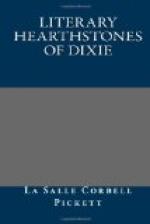Suddenly there came from thicket or copse of the distant forest, I could not tell where, a “wood-note wild” of some bird I had not heard for half a century nearly, and in an instant the beauty, the mystery, the holiness of nature came back to me just as it came in childhood when sometimes my playmates left me alone in the great orchard of my home in Cumberland.
He avows himself
—a pagan and a worshipper of Pan, loving the woods and waters, and preferring to go to them (when my heart was stirred thereto by that mysterious power which, as I conceive, cares little for worship made stately and to order on certain recurring calendar days) rather than to most of the brick and mortar pens that are supposed to hold in some way that which the visible universe no more contains than the works of his hands contain the sculptor who makes them; for I take it that the glittering show revealed by the mightiest telescope, or by the hope mightier even than the imagination of the highest mind, is but as a parcel of motes shining in a single thin beam of the great sun unseen and hidden behind shutters never to be wide opened.
Our “Virginia Realist” needed not to call upon his imagination for personalities with which to fill his free-hand sketches of nature, for there was in his kindly humor and geniality a charm which drew forth from all he met just the qualities necessary to fill in his world with the characters he desired. A wide and deep sympathy enabled him to make that world so real and true that his readers entered it at once and found therein such entertaining companionship that they were fain to abide there ever after.
In 1835, when a boy fresh from Parley’s History of America, the future humorist made a journey from Cumberland County to Lynchburg, hearing by the way alarming sounds which the initiated recognized as the report of the blasting of rocks on the “Jeems and Kanawha Canell.” To the boy, with second-hand memories of Washington and his men tramping confusedly about his mind, the noises signified a cannonade and he waited in terrified excitement for the British bullet that was to put him beyond the conflicts of the world, trying to postpone the evil moment by hiding between two large men who were fellow-passengers with him. This was in the days when the celebrated “Canell” was a subject for the imagination to contemplate as a triumph of futurity and an object for hope to feed upon—a period in which the traveller embarked upon a fascinating batteau and spent a week of dreamy beauty in sailing from Lynchburg to Richmond and ten days back to the hill city. Time was not money in those days, it was vision and peace and color and sunshine and all wherein the soul of man delighteth itself and reveleth in the joy of living. The stream of imagination was no more dammed than the river in which “shad used to run to Lynchburg,” showing a highly developed aesthetic taste on the part of the shad. The youthful traveller went to the Eagle Hotel and took a view of Main Street and dared not even wonder if he should ever be big enough to live in Richmond. Rapt soul of youth’s dawn, with myriad dreams all to vanish when the sun rises upon the morning!




